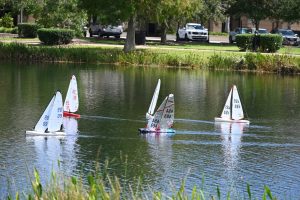
To include your event in the Briefing and Live Calendar, please fill out this form.
Weather: Partly sunny. Showers with thunderstorms likely this afternoon. Some thunderstorms may produce gusty winds and frequent lightning this afternoon. Highs in the mid 90s. South winds 5 to 10 mph. Chance of rain 90 percent. Heat index values up to 109. Tonight: Mostly cloudy. Showers with thunderstorms likely in the evening. Some thunderstorms may produce gusty winds and frequent lightning in the evening. Lows in the mid 70s. South winds 5 to 10 mph. Chance of rain 90 percent.
- Daily weather briefing from the National Weather Service in Jacksonville here.
- Drought conditions here. (What is the Keetch-Byram drought index?).
- Check today’s tides in Flagler Beach here.
- tropical cyclone activity here, and even more details here.
Today at a Glance:
Coffee With Commissioner Scott Spradley: Flagler Beach Commission Chairman Scott Spradley hosts his weekly informal town hall with coffee and doughnuts at 9 a.m. at his law office at 301 South Central Avenue, Flagler Beach. All subjects, all interested residents or non-residents welcome. The gatherings occasionally feature a special guest.
The Saturday Flagler Beach Farmers Market is scheduled for 9 a.m. to 1 p.m. today at Wickline Park, 315 South 7th Street, featuring prepared food, fruit, vegetables , handmade products and local arts from more than 30 local merchants. The market is hosted by Flagler Strong, a non-profit.
Democratic Women’s Club of Flagler County meeting at 6 p.m. at the Palm Coast Community Center, 305 Palm Coast Parkway NE.
‘The Guy Who Didn’t Like Musicals’ at City Repertory Theatre, at 7:30 p.m. Thursday July 18, Friday July 19, Saturday July 20 and Monday July 22. A matinee performance will be at 3 p.m. Sunday July 21. In CRT’s black box theater at City Marketplace, 160 Cypress Point Parkway, Suite B207, Palm Coast. Tickets are $30 adults and $15 students, available online at crtpalmcoast.com or by calling 386-585-9415. Tickets also will be available at the venue just before curtain time. See Rick de Yampert’s preview: “Alien Menace and Combustible Dancing Shake Up City Repertory Theatre with “The Guy Who Didn’t Like Musicals.”
Grace Community Food Pantry, 245 Education Way, Bunnell, drive-thru open today from 10 a.m. to 1 p.m. The food pantry is organized by Pastor Charles Silano and Grace Community Food Pantry, a Disaster Relief Agency in Flagler County. Feeding Northeast Florida helps local children and families, seniors and active and retired military members who struggle to put food on the table. Working with local grocery stores, manufacturers, and farms we rescue high-quality food that would normally be wasted and transform it into meals for those in need. The Flagler County School District provides space for much of the food pantry storage and operations. Call 386-586-2653 to help, volunteer or donate.
Buddy Guy performs a rescheduled show at the St. Augustine Amphitheatre, 1340C State Road A1A South, St. Augustine, 7:30 p.m. All previously purchased tickets will be valid for the rescheduled show.
Random Acts of Insanity’s Roundup of Standups from Around Central Florida, 8 p.m. at Cinematique Theater, 242 South Beach Street, Daytona Beach. General admission is $8.50. Every third Saturday RAI hosts Live Standup Comedy with comics from all over Central Florida.
Etymologies: The word today is casuistry, especially the OED’s definition that has it as “Often (and perhaps originally) applied to a quibbling or evasive way of dealing with difficult cases of duty; sophistry,” the casuistry that, in Bolingbroke’s words from 1740 (Bolingbroke was a favorite of Voltaire’s), “destroys by Distinctions and Exceptions, all Morality, and effaces the essential Difference between Right and Wrong,” or as John Stuart Mill put it in Utilitarianism, “Under every creed..self-deception and dishonest casuistry get in.” Don’t think I’m well read: I stole the quotes from the OED. But this I did not steal: Since Mencken is dead, I like to look up these words’ use in the New York Times, and here comes a use in 1928, in a headline no less, “Students in Casuistry,” the headline to an editorial on Aug. 15, which opens with this odd line: “Wet Republicans here who are more Republican than Wet are now engaged in ‘reconciling’ Mr. Hoover’s Dryness with their own Wetness.” Then one remembers that this was written near the tenth anniversary of the 18th Amendment, that prohibitionist tribute to the Taliban before its time. Hoover in his campaign for president was suggesting, or pandering, that he might favor repealing the Amendment. He never did. He was full of casuistry–a word that, today, sums up the entirety of the platform of the once and future president, Donald Trump.
—P.T.
View this profile on Instagram
![]()
The Live Calendar is a compendium of local and regional political, civic and cultural events. You can input your own calendar events directly onto the site as you wish them to appear (pending approval of course). To include your event in the Live Calendar, please fill out this form.
December 2025
Flagler Beach United Methodist Church Food Pantry
Wadsworth Park Reopening
Weekly Chess Club for Teens, Ages 10-18, at the Flagler County Public Library
Rotary’s Fantasy Lights Festival in Palm Coast’s Town Center
Random Acts of Insanity Standup Comedy
Separation Chat: Open Discussion
The Circle of Light A Course in Miracles Study Group
January 2026
Flagler Beach United Methodist Church Food Pantry
Flagler County Drug Court Convenes
Story Time for Preschoolers at Flagler Beach Public Library
Model Yacht Club Races at the Pond in Palm Coast’s Town Center
For the full calendar, go here.

At every session of Congress there is a legislative assault upon the Bill of Rights for the benefit of some group or other of administrative bureaucrats, and save on very rare occasions the Federal courts always conjure up some sophistry to justify it. It causes considerable surprise, indeed, when they fail to do so.
–From H.L. Mencken’s Prejudices, Sixth Series (1927).







































Pogo says
@As stated
In this world of sin and sorrow, there is always something to be thankful for; as for me, I rejoice that I am not a Republican.
— H. L. Mencken
https://www.brainyquote.com/authors/h-l-mencken-quotes
Ray W. says
Hello Pogo.
Do you think this quip possible:
“Surely not everybody was kung-fu fighting.”
Pogo says
@Ray W.
In the home of the 2nd Rate Amendment — a given.
James says
“This is not about me… it’s about you… ”
https://indianacapitalchronicle.com/wp-content/uploads/2024/07/GettyImages-2162611804-768×432.jpg
Perhaps it’s just me, but I have trouble believing that with a huge TRUMP display in the background… even Elvis would be impressed at that big a light display.
Just say’n… the picture tells differently. But then that’s entertainment, the biggest show on earth… now this way to the abyss… oops, eh… egress.
Full article…
https://indianacapitalchronicle.com/2024/07/19/trump-describes-assassination-attempt-in-speech-accepting-gop-presidential-nomination/
Nancy Skadden says
Flagler Democratic Women’s Club now meets at 9:30 am not 6 pm. Thank you for changing your calendar notice.
Ray W. says
In one of those quirks of history, coal extracted from the mines of eastern Pennsylvania powered the factories of New York and Philadelphia, dating from the early 19th century. But how did the coal get to the factories?
Originally, barges known as “Durham” boats carried freight down the dangerous and often shallow stretches of the Delaware River. Another form of barge was comprised of logs lashed together for a one-way trip downstream. Once the cargo was off-loaded, the log barge was dismantled, and the lumber was cut and carved into consumable products.
In the early-19th century investors received charters from both the Pennsylvania and New Jersey legislatures to build a canal; the Delaware & Raritan Canal opened in 1832. Investors funded the digging of the canal from the area of Raven Rock, New Jersey down to Trenton and beyond, bypassing many of the dangerous stretches of the river. For nearly a century, the D & R Canal was one of the nation’s busiest and most profitable canals, outstripping the traffic on the famed Erie Canal.
When steam power replaced horses and mules dragging the canal traffic, a rail line was built on the banks of the canal. In time, the railroad, too, became one of the busiest lines in the country. In the mid-1870s, the Pennsylvania Railroad, which had bought the Belvidere and Delaware Railroad and had grown to become a regional entity, owned 47 steam locomotives.
Shortly after WWII, the Pennsylvania Railroad introduced an innovative technology; it began using the steel rails as telephone lines. Dispatchers could converse directly with engineers without the company having to install telephone lines alongside the tracks. Other companies sent representatives to evaluate the technology; they, too, adopted it for their trains. In 1966, “radiophones” replaced the technology.
This from a history of the area titled: STORIES from Raven Rock NEW JERSEY, published by AMERICAN CHRONICLES – A HISTORY PRESS SERIES. Edited by R. Curt Chinnici (2012). Once you read Blue Highways, even the most obscure historical publications present with potential delights.
I don’t doubt that more than a few Flagler County residents know of Raven Rock and Raritan Township. Today, the area is perhaps best known for the New Hope-Stockton tourist railroad over the Delaware, linking tourists coming out of the two great eastern cities to Bucks County, Pennsylvania. This is Amish and Quaker country.
As for me, I know that many FlaglerLive commenters cannot help but trip over each other claiming that America is being destroyed by this or that. I am not one of them. America has many seemingly intractable problems. But technological changes are coming fast and furious. America’s energy sector, held back by decades of obstruction in state and federal legislatures, is being dragged kicking and screaming into the 21st century. The gullible among us, after having been indoctrinated by lies for far too long, continue to resist. Electric vehicles are the future. Renewable energy sources are the future. The opportunities are endless.
I recently watched a documentary that is part of the Mighty Ships line of shows. About ten years ago, a cruise ship was launched with four diesel engines providing 8600 horsepower to run the generators needed to power both the ship’s infrastructure and the electric motors. I recently commented on a modular line of natural gas engines released by Cummins. The Cummins design is simply a diesel engine that doesn’t use diesel fuel; it runs on natural gas. Sixteen Cummins engines, in a modular combination, can produce just as much power.
A company has designed a modular locomotive that can replace diesel fuel in the rail industry. The South Carolina-based company just signed a long-term deal with Argentina to refit the entire Argentine rail fleet of locomotives with natural gas-powered engines. Watching the Mighty Ships documentary, I couldn’t help but think that the same modular natural gas engine technology could easily replace diesel engines in any new ship being built. The Cummins engines are rated as reliable for 30 years, they cost less to operate, they are easy to work on. If a problem arises that requires maintenance or repair to one of the many modular engines wouldn’t cause a ship to lose 1/4 of its power; it would lose 1/16th of its power. A modular Cummins engine can be unbolted, pulled out by a forklift and replaced with a spare engine in less than an hour. The ship would be without 1/16th of its power for an hour. The modular engine could be off-loaded when the ship returns to home port and sent to a repair facility. A new spare can be forklifted onto the ship.
Efficiencies are key in the shipping industry. Just carry a spare modular Cummins engine on a cruise to deal with issues that arise and have a central repair depot perform the repairs in the city that is the home port of call for the ship.
My America is a growing thriving economy that is the strongest overall economy in the world. My America is hopping with new ideas, new industries, new and efficient options. Yes, I live in a different America than do many FlaglerLive commenters who cannot open their minds to the many opportunities that are out there.
A couple of weeks ago, I read a WSJ article about a small town in rural Wisconsin with a town population of under 5000. The reporter described the town as a conservative farm community that went for Trump by 22 points in 2020. About 15-20 years ago, a professor was dispatched to the regional state university outpost to head a department that would seek out and teach of efficiencies in energy and farming. He attempted to connect to local leaders. His initial success was persuading the tiny town that was the county seat to spend the money necessary to install a solar system on the local state-owned liquor store roof. It didn’t take long for the city commission to do the math. In time, the solar plant would save the city money. The professor started a student-run composting business. It didn’t take much to persuade local farmers to participate by providing agricultural waste and manure to the student business. In time, the composting business grew enough for the students to gift the organization to the community; it continues to grow, providing local farmers with low-cost natural fertilizers. The community asked the professor what else they could do. Soon, two wind turbines sprouted in the county. Solar installations spread to the roofs of other government buildings. Government administrators sought out federal and state grants to fund the changes. Today, according to the Journal, the community’s electric bills are one-third the rate of the national average and dropping. Farmers spend far less on fertilizers, too. The farming community doesn’t look at the issue as combatting climate change; it looks at it as an issue of pragmatism. A significant number of other Wisconsin rural farming communities are lining up to learn what they can do to cut costs, too. People are pulling together instead of tearing apart. One rural community has formed an association with another five communities to pool resources to follow the Morris Model, as it is now called.
I looked up the philosophical definition of pragmatism. It means:
“[A]n approach that assesses the truth of meaning of theories or beliefs in terms of the success of their practical application.”
I think I see the problem. A number of Flagler County leaders do not believe in a pragmatic approach to local government. Why look for the truth of meaning of theories or beliefs when dogmatism is seen as a serious governing model?